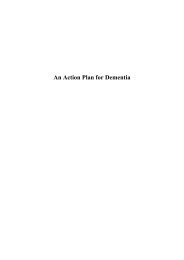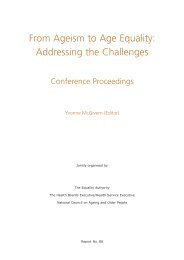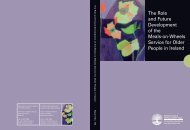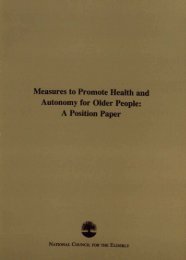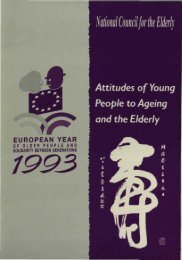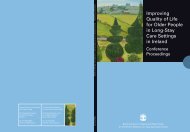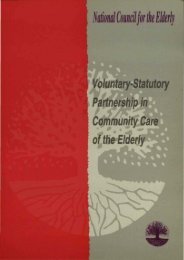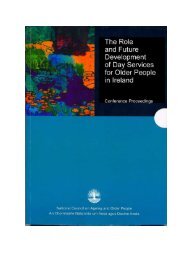Assessment of Older People's Health and Social Care Needs and ...
Assessment of Older People's Health and Social Care Needs and ...
Assessment of Older People's Health and Social Care Needs and ...
- No tags were found...
You also want an ePaper? Increase the reach of your titles
YUMPU automatically turns print PDFs into web optimized ePapers that Google loves.
Ms. Mary McDermott, Regional Director, Services for <strong>Older</strong> People,Western <strong>Health</strong> Board, Merlin Park Regional Hospital, GalwayAt the end <strong>of</strong> our Conference on assessment, there are a number <strong>of</strong> points that I would like to make:• Firstly, I would like to challenge the concept that a person is old at 65 years. <strong>Older</strong> people areliving longer, healthier lives <strong>and</strong> I think we should be planning services for older people aged 75years <strong>and</strong> over. As a general rule, I think we need to focus more on health promotion for olderpeople. We also need to examine the idea <strong>of</strong> screening older people who are considered to be well<strong>and</strong> to carry out pilot studies to assist us in developing this idea.• We have heard many examples <strong>of</strong> good practice in assessment <strong>of</strong> older people's needs today.Though the approaches to assessment described have developed in isolation from each other, theyshare many similarities <strong>and</strong> I find that reassuring in terms <strong>of</strong> the future direction <strong>of</strong> this work.However, assessment approaches will fail if we do not get our health systems <strong>and</strong> health deliveryservices right. We must be able to respond to the needs that are identified through assessmentprocesses. Furthermore, we must enable older people to access the services that they need. TheGP <strong>and</strong> the Practice Nurse each have key roles to play in facilitating this kind <strong>of</strong> access. Otherchallenges for us include the need to involve service users in the planning <strong>of</strong> assessmentapproaches <strong>and</strong> to look at how we can evaluate our approaches to find out whether they areimproving the quality <strong>of</strong> life <strong>of</strong> older people.• All older people who need it should have access to a geriatrician <strong>and</strong> his/her team <strong>of</strong> whatevertype, <strong>and</strong> we need to develop a common approach to this part <strong>of</strong> the assessment process. Inparticular, we need to develop a common assessment process for admission to long-termresidential care. At the moment, the processes for admission to public <strong>and</strong> private facilities differgreatly.There is also a need to include service users in our assessment processes.• I want to include a comment about the 'at risk' register <strong>of</strong> older people which has been mentionedhere today. I have difficulty with the concept <strong>of</strong> a book <strong>of</strong> names which, in my view, is what itamounts to. We do need data for planning purposes, but could achieve this if we installedeffective IT systems. We have been talking about computerising our records in the health boardsfor many years now.• What is the way forward from the point we're now at 7 My view is that we don't know what weneed, but we do need a process to help us find out what we need. A National Steering Committeecould be established to work on the agenda <strong>of</strong> a common assessment process. This Committeewould look at what needs to happen <strong>and</strong> gUide the future development <strong>of</strong> a common assessmentprocess. In that context, a number <strong>of</strong> pilot projects could be undertaken, but we would need ringfencedfunding for those <strong>and</strong> appropriate follow-up services for clients.I!Conference Proceedings





